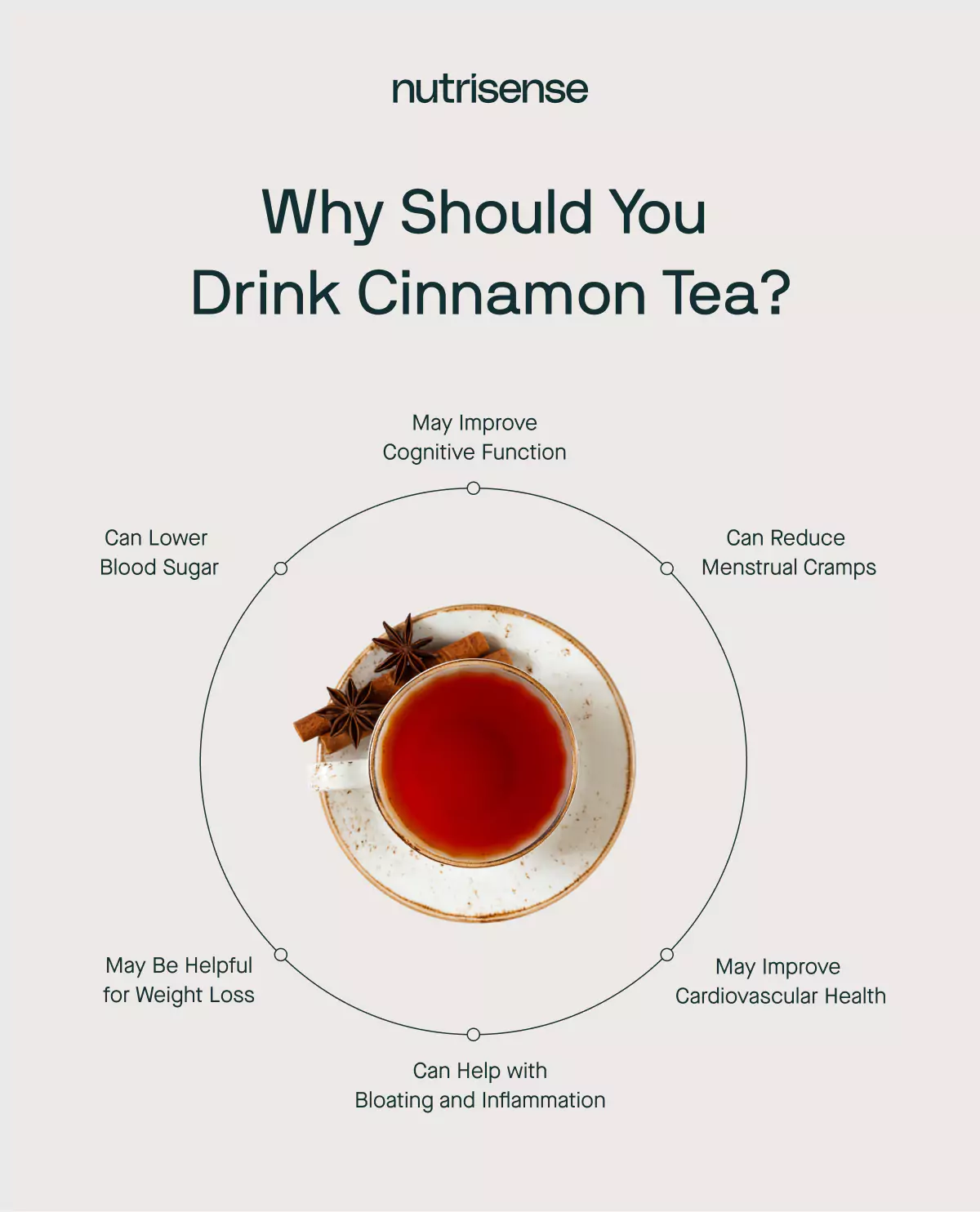Cinnamon Tea Benefits
Cinnamon tea, with its delightful aroma and rich flavor, has been cherished for centuries not only for its taste but also for its numerous health advantages. In this article, we delve into the enticing world of cinnamon tea benefits, exploring the science behind its potential to enhance well-being.
Cinnamon tea, commonly prepared from the bark of the Cinnamomum tree, boasts a unique blend of antioxidants, anti-inflammatory compounds, and essential nutrients. These components work in harmony to offer a range of health benefits, making cinnamon tea a valuable addition to your daily routine.
Nutritional Profile of Cinnamon Tea
To understand the magic of cinnamon tea, it’s crucial to start with its nutritional composition. Cinnamon tea is a treasure trove of vital nutrients, including vitamins, minerals, and antioxidants. Here’s a glimpse of what a cup of cinnamon tea brings to the table:
Vitamins:
Cinnamon tea provides a modest dose of essential vitamins, particularly vitamin K and vitamin C, which play roles in bone health and immune support.
Minerals:
Rich in minerals like manganese and calcium, cinnamon tea contributes to bone health and overall well-being.
Antioxidants:
Cinnamon is renowned for its high antioxidant content, which helps combat oxidative stress and reduce the risk of chronic diseases.
Key Health Benefits of Cinnamon Tea
Now, let’s dive into the captivating realm of cinnamon tea benefits and discover how sipping on this aromatic brew can positively impact your health:
Blood Sugar Control
One of the most celebrated benefits of cinnamon tea is its potential to regulate blood sugar levels. Cinnamon contains compounds that enhance insulin sensitivity, allowing your cells to better absorb glucose from the bloodstream. This effect can be particularly valuable for individuals with diabetes or those looking to manage their blood sugar.
Heart Health Promotion
Cinnamon tea has been linked to improved heart health. Regular consumption may help lower “bad” LDL cholesterol levels, reduce blood pressure, and decrease the risk of heart disease. These heart-protective properties can be attributed to cinnamon’s anti-inflammatory and antioxidant abilities.
Anti-Inflammatory Properties
Chronic inflammation is the root cause of several health problems, including arthritis and heart disease. Cinnamon tea’s anti-inflammatory compounds, such as cinnamaldehyde, can help combat this silent threat, supporting overall well-being.

Antioxidant Properties
Cinnamon tea’s remarkable antioxidant properties deserve special attention. These antioxidants, including polyphenols and flavonoids, play a pivotal role in safeguarding your health. By neutralizing harmful free radicals in your body, cinnamon tea helps protect cells from damage, reducing the risk of chronic diseases and supporting overall well-being.
Anti-Inflammatory Effects
Chronic inflammation is a common denominator in many health conditions, from arthritis to cardiovascular disease. Cinnamon tea, with its natural anti-inflammatory compounds, offers a gentle yet effective way to combat this silent menace. By sipping on cinnamon tea regularly, you may alleviate inflammation and reduce the risk of associated diseases.
Cinnamon Tea for Weight Management
For those on a journey to shed extra pounds, cinnamon tea can be a trusted ally. The tea’s unique blend of compounds can boost metabolism and improve insulin sensitivity, making it easier for your body to process carbohydrates. This, in turn, can contribute to weight management and support your fitness goals.
Savoring a cup of cinnamon tea before or after meals can help control cravings and keep you feeling satisfied. However, it’s essential to remember that cinnamon tea is not a magical weight loss solution but rather a complementary tool in your wellness toolkit.
Cinnamon Tea and Digestive Health
When it comes to digestive well-being, cinnamon tea shines as a natural remedy. It can help alleviate digestive discomfort, reduce bloating, and promote healthy digestion. The anti-inflammatory properties of cinnamon come into play here, soothing the digestive tract and supporting gastrointestinal health.
Cinnamon tea is also known for its potential to ease indigestion and alleviate gas. Incorporating this aromatic beverage into your daily routine may lead to a more comfortable and balanced digestive system.
Cinnamon Tea and Immune System Support
In today’s world, bolstering our immune systems is a top priority. Cinnamon tea can play a role in fortifying your body’s defenses. Rich in antioxidants, it helps neutralize harmful invaders and strengthens your immune response. Regular consumption of cinnamon tea may help ward off common illnesses and keep you feeling your best.
Preparing and Enjoying Cinnamon Tea
Making and enjoying cinnamon tea is a delightful experience that doesn’t require culinary expertise. Here, we offer simple yet effective guidelines for brewing the perfect cup of cinnamon tea. Whether you’re new to this aromatic beverage or a seasoned enthusiast, these tips will help you savor its full flavor and health benefits.
Possible Side Effects and Precautions
While cinnamon tea boasts numerous advantages, it’s essential to be aware of potential side effects and precautions. For some individuals, excessive consumption may lead to adverse reactions, such as digestive issues or allergic reactions. We guide safe and moderate consumption, ensuring you enjoy the benefits without any unwanted effects.
FAQ about cinnamon tea benefits
Q: Is cinnamon tea good for managing diabetes?
A: A resounding yes! Cinnamon tea can help regulate blood sugar levels, making it a valuable ally for individuals with diabetes.
Q: How do I brew the perfect cup of cinnamon tea?
A: Brewing cinnamon tea is simple. Add a cinnamon stick or powder to hot water, steep, and enjoy! Detailed instructions are available in our article.
Q: Can cinnamon tea help with weight loss?
A: Indeed, cinnamon tea may support weight management by boosting metabolism and reducing cravings.
Q: Are there any potential side effects of consuming cinnamon tea?
A: While generally safe, excessive consumption can lead to digestive issues. We provide precautions in our article.
Q: Is cinnamon tea safe for pregnant women?
A: Moderate consumption is generally safe during pregnancy, but it’s advisable to consult a healthcare provider.
Q: What types of cinnamon are best for making tea?
A: Ceylon cinnamon (true cinnamon) and cassia cinnamon are commonly used for tea. Explore the differences in our article.
Q: Can cinnamon tea help reduce high blood pressure?
A: Cinnamon tea’s anti-inflammatory properties may contribute to lower blood pressure levels.
Q: Does cinnamon tea have caffeine?
A: No, cinnamon tea is naturally caffeine-free, making it a suitable choice for those looking to avoid caffeine.
Q: How long should I steep cinnamon tea for the best flavor?
A: Steeping for about 10-15 minutes allows the flavors to infuse fully. Adjust to your taste.
Q: Can children safely drink cinnamon tea?
A: Cinnamon tea can be suitable for children in moderation, but be cautious with young children due to the potential for allergies.
Conclusion:
In conclusion, cinnamon tea is more than just a warm and comforting beverage. It’s a natural elixir that can enhance your overall well-being. By embracing the benefits of cinnamon tea, you empower yourself to support your health in numerous ways. From blood sugar control to heart health, and digestion to immune system support, this aromatic tea offers a wide array of advantages.



